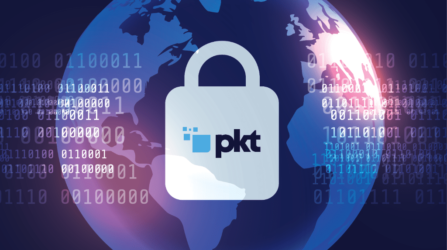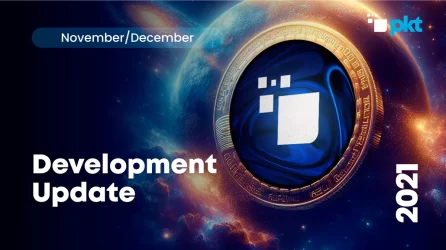
There are two ways by which people take action: they either believe in something, or they are paid. When people believe in something they may even be willing to invest their time and money in the cause. However, without ongoing investment or financial benefit, even the most important causes can lose support. Blockchains provide a novel way to financially reward people for taking action.
PKT is based on the Bitcoin code, and provides an economic incentive for people who have access to the Internet (Edge Points) to connect their unused bandwidth to the PKT Network. Anyone who believes that the Internet should be low cost and accessible to all can now be paid to participate.
Edge Points are able to monetize their unused bandwidth by installing a computer program called PacketCrypt, and mining the world’s first bandwidth-hard proof of work (PoW). A PoW refers to a computer-based effort that proves a specific computational effort actually occurred.
The PacketCrypt protocol performs a computational effort in which Edge Points transfer data to mining pools in the PKT Network. This announcement mining effort requires bandwidth. When Edge Points perform this action and expend bandwidth they receive PKT Cash payments every 60 seconds. PKT Cash is the native currency that is generated by the PacketCrypt PoW. In effect, Edge Points are maintaining their connectivity to the PKT Network and being paid for expending bandwidth.
Generally, centralized ISPs, with multi-billion dollar marketcaps, maintain internet infrastructure. The goal is to build a network that is not owned by these governments or corporations. To accomplish this, Edge Points around the world need to operate the PKT Network infrastructure. Since operating infrastructure has a financial cost, PKT enables Edge Points to be paid to maintain their physical link between the Internet and the PKT Network, without technical knowledge.
This decentralizes the role of the ISP and is a paradigm shift in the way the world accesses the Internet. The result is a faster, lower cost mesh network that uses end-to-end encryption for privacy. As the PKT Network scales and the roadmap technologies are deployed people will have accessibility to the Internet from anywhere in the world without paying a traditional ISP.
People who have internet in their homes or offices pay for a certain amount of bandwidth per second from their internet service provider (ISP). However, very few Edge Points consume all of the bandwidth they pay for 24/7. This excess bandwidth is wasted. Edge Points that install PacketCrypt perform an action called mining. There are two different types of PKT mining: 1) announcement mining, and 2) block mining. Anyone can do announcement mining on a home computer, server or even a cellular device. Announcement mining uses a device’s computer processor (CPU) to generate small 1KB messages known as announcements.
These announcements are broadcasted across the PKT Network to mining pools and block miners who pay for the announcements when they win a block. The broadcasting of announcements simulates the global transfer of data packets across the PKT Network. The PacketCrypt protocol autonomously facilitates this effort between announcement miners and block miners. Even though the announcements themselves do not contain unique data, the transmission of the data is real. In the forthcoming phases of the PKT roadmap it will be possible for Edge Points to transmit real-world data through virtual private networks (VPN) and earn additional payments for providing that service.
Alternatively, block miners operate in what are called mining pools. Operating a mining pool requires networking experience, powerful encryption hardware, and significant bandwidth infrastructure. Mining pools collect and validate the billions of announcements they receive every 60 seconds and execute a memory-hard mining algorithm to win a block. Each block miner pre-commits a merkle tree root for the collected announcements, then competes to solve the PacketCrypt puzzle using those announcements. When a block is won, all the announcement miners that submitted to the winning mining pool are automatically paid.
Edge Points that connect to the PKT Network are paid in a unique currency called PKT Cash. 6 billion PKT Cash coins will be mined over 63 years. When a block is won, 20% of the winnings go to the Network Steward with the balance of the coin base going to the winning mining pool. The coins are divided between the announcement miners, block miners and pool operators. The Network Steward is a democratically elected wallet address that grants the collected coins every 90 days to fund infrastructure growth and technology development, otherwise the coins are burned.
The recipients of the mined PKT Cash have the choice to hold the coins or sell on the open market. Since miners are paying cash to operate infrastructure, there is a minimum value to each coin mined. The value of PKT Cash is equal to no less than the costs incurred during a fixed period of time to mine the coins, divided by the number of coins mined during the same fixed period of time. For example, if a miner incurred $300 in costs to mine 20,000 PKT Cash coins, then each coin would have a minimum value of $300 divided by 20,000 PKT, which equals $0.015 per coin.
The PKT blockchain distributes 10% of the remaining PKT Cash to be mined every 100 days, and then uses a 10% decay rather than an abrupt 4 year halving used by Bitcoin. For example, in the first 100 days there were 6 billion coins remaining, so 600 million coins were mined over the first 100 days, equaling 6 million coins per day. Since a mined block occurs every 60 seconds, and there are 1440 seconds per 24 hours, 4,166.667 PKT were paid out every 60 seconds during the first 100 days. On day 101, there were 5.4 billion coins remaining, so 540 million coins were mined during the subsequent 100 days. During the second 100 days, the block rewards were reduced by 10% to 3,750 PKT paid out every 60 seconds, and so on.
As more and more Edge Points connect to the PKT Network, the difficulty to mine increases. The difficulty is a number that indicates the intensity of mining power being thrown at the PKT blockchain. As the difficulty increases, the amount of CPU power and bandwidth a miner needs to expend to earn rewards increases. However, a fixed amount of PKT Cash is paid every 60 seconds, and mining rewards are divided by all active miners. As the amount of PKT paid per block declines every 100 days, the value of PKT is determined by the mining community’s willingness to sell at a specific price relative to the cost to mine.
PKT incentivizes Edge Points to connect local infrastructure to the PKT Network. This infrastructure is existing cable internet, fiber, and satellite backhaul. Edge Points direct bandwidth into the PKT Network, which builds a peer-to-peer infrastructure that is operated by the people, for the people. Forthcoming PKT technology will enable Edge Points to sell their bandwidth into a decentralized bandwidth marketplace without technical experience. This shifts power from centralized ISPs and governments to the people, who become the ISPs selling internet bandwidth to their neighbor in a decentralized bandwidth marketplace.
The PKT vision is for people to get on the internet using a low cost antenna connected to their neighbor. This type of mesh networking enables the next billion people to gain access to the internet. While many people may believe in a low cost, high speed Internet that is accessible by all, accomplishing this can now be achieved using pre-existing technology operated by people who are incentivized to take action. PKT provides this economic incentive to monetize the Internet bandwidth you already pay for.
The PKT Network is a completely open source project, with no corporation, no CEO, no investors and no-premined coins. As the network grows, PKT makes it possible to decentralize internet access worldwide. This is accomplished by enabling internet sharing, mesh networking, and Virtual Private Networking (VPN) with a minimum cost of free. The result is people eventually obtaining internet access through an Edge Point, without paying a traditional ISP.
PKT Network is supporting the internet by the people, for the people. You can view the roadmap for the PKT project here: http://pkt.cash/roadmap and join the PKT community here: http://pkt.cash/community.
Go back to Blog →
Updates
This update will cover PKT technology development progress through November & December 2021. PKT is an open-source project. All of the PKT blockchain code and the various projects being developed…

Announcements
The world of blockchain and cryptocurrency is often marked by moments of triumph and innovation, but sometimes, even the most meticulously planned operations can face unexpected challenges…